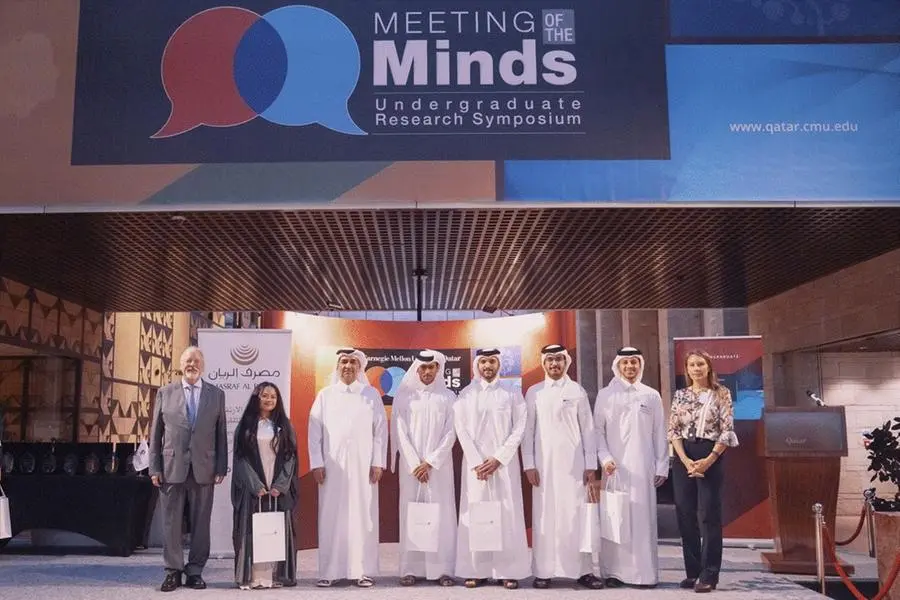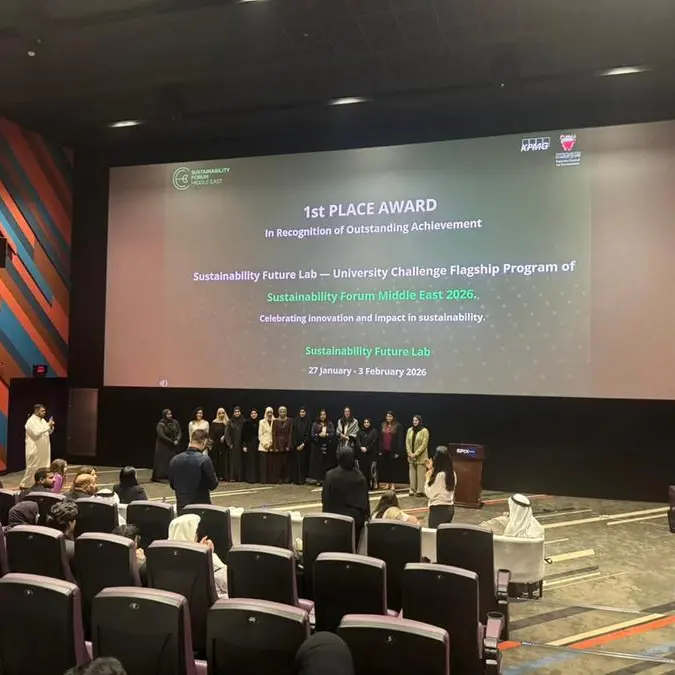PHOTO
Research projects in some of the key areas that affect Qatar were showcased at the 2024 Meeting of the Minds research symposium at Carnegie Mellon University in Qatar. CMU-Q is a Qatar Foundation partner university. The 51 posters at the event touched on many of the key challenges facing Qatar, including precision medicine, sustainability, gender equity and artificial intelligence.
Michael Trick, dean of CMU-Q, spoke about the university’s unique approach to research: “Research is an integral part of Carnegie Mellon, and I believe it is critical for an undergraduate education,” he said. “We encourage students to use their knowledge and creativity to search for solutions to the challenges we face as a global community.”
Projects included research in CMU-Q’s four major program areas, as well as projects in the arts and sciences and interdisciplinary inquiries.
The National Planning Council (NPC) once again sponsored an award category at Meeting of the Minds for research representing Qatar National Vision 2030.
Dr. Youssuf Abdul Rahman Al-Mulla from the National Planning Council said: “Each year, we come to CMU-Q to learn about how student research is contributing to the goals of Qatar National Vision 2030. This generation of researchers are building the skills and human capacity to transform Qatar into a knowledge-based economy. We are pleased to be part of Meeting of the Minds once again.”
Eight awards were given by CMU-Q in the categories of Best Research Project, Most Promising Research and Best Research Poster. For the second year in a row, prizes were sponsored by Masraf Al Rayan, represented by Mr. Hasan Al Jaidah, AGM - Premier Banking, who joined Dean Michael Trick to present the awards.
Mr. Fahad Bin Abdulla Al Khalifa, Group Chief Executive Officer from Masraf Al Rayan said: “It is our privilege once again to support student research at CMU-Q’s Meeting of the Minds. The projects at Meeting of the Minds show thoughtfulness, creativity and innovation, and we congratulate all of the participants for such an impressive showcase of research and inquiry.”
First place winners
The first place project went to Adel Fergatova, who investigated the relationship between cancer cells and fibroblasts. Fergatova published related research earlier this year in the leading international journal, Frontiers in Immunology. She is advised by Nesrine Affara.
Most promising research went to Mariam Afifi’s exploration of a novel genetic marker that could lead to more precise, personalized cancer treatments. Ihab Younis was the faculty advisor.
Best poster went to Malika Dixit’s analysis of gender bias in academic job descriptions. Taeyong Park served as her advisor.
Research representing Qatar National Vision 2030
The National Planning Council awards were given to the best posters representing the Qatar National Vision 2030, covering the four pillars of human, social, economic, and environmental development. NPC awards were presented by Dr. Yousuf A. R. Almulla, Director of Strategy Implementation Follow-up Department.
The award-winning projects included FEA car crash test analysis software, an interdisciplinary analysis of cancer representation and research funding in Qatar, optimizing the supply chain processes of Gulf International Services, transthoracic echocardiography and mortality in sepsis, and gender bias in job descriptions in STEM fields.
Fostering a scientific community in Doha
Subject experts from across Qatar judged the poster presentations, as well as 15 faculty and staff representatives from CMU-Q. A total of 42 external judges participated in the event, including experts from Aman Hospital, Doha Institute for Graduate Studies, Georgetown University in Qatar, Hamad Bin Khalifa University, Mada – Assistive Technology Center Qatar, Qatar University, Sidra Medicine, University of Doha for Science & Technology, VCUArts Qatar, and Weill Cornell Medicine – Qatar.
Carnegie Mellon University in Qatar offers undergraduate programs in biological sciences, business administration, computer science and information systems.




















